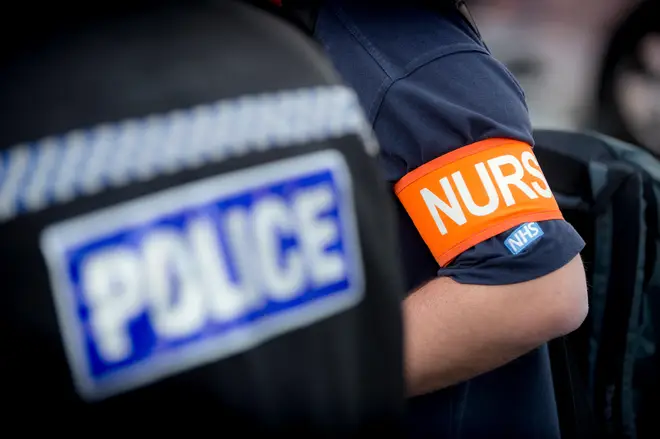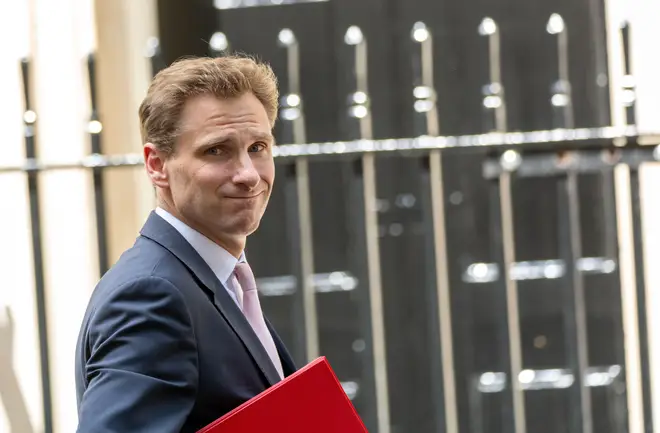
Paul Brand 10am - 12pm
26 July 2023, 08:10

Policing Minister Chris Philp explains plans to stop cops attending mental health calls
Police are to cut back massively on the number of mental health callouts they attend in a bid to free up time and make sure people in crisis get the help they need.
Some of the 43 police forces in England and Wales attend as much as 80% of mental health callouts. Ministers want this to go down to as low as 20% over the next two years.
Officers will also aim to hand over patients detained under mental health laws within an hour, rather than the current average of 12 hours.
Speaking to Nick Ferrari at Breakfast on LBC Policing Minister Chris Philp said dealing with mental health calls was "taking up a very large amount" of police time.
He explained there were plans to bring in "extra resources" with £150m for "places of safety and mental health ambulances," meaning people suffering crisis would not be taken to hospital by a police car.
Watch the whole interview with the Policing Minister in the video at the top of the page.
Read more: ‘Lives at risk’: Fears over Met plan to stop attending 999 calls linked to mental health

Former Scotland Yard Detective unpacks whether the police are getting their priorities right,
In Humberside, a pilot called Right Care, Right Person has seen an average of around 1,400 hours per month of police time saved.
Mr Philp said this would work out at about one million hours per year nationally if similar savings took place across all forces.
After the Met Police announced in May its intention to slash mental health callouts, the head of mental health charity Mind said that lives could be at risk.

The force's commissioner Sir Mark Rowley wrote to health and social care services to say police will not be sent after August 31 unless there is a threat to life.
Sarah Hughes, Mind's CEO, said: "I think that people who are in mental health crisis are often experiencing suicidal thoughts, are often in the middle of active self harm, and so it does demand police/paramedic intervention urgently."
Rachel Bacon, the National Police Chiefs' Council lead for policing and mental health, said that officers would always attend where there was a threat to life or someone was in immediate danger.
"Individuals told us that the attendance of police officers when they are experiencing health or social care issues has a negative impact and they feel criminalised," she said.
"It is often the case that attending officers are unable to provide the services which are needed to resolve the situation effectively.

"There is broad consensus that the police's primary purpose is to maintain peace and to prevent and detect crime. That is what the public rightly expect us to do."
Mr Philp said the NHS would have £2.3 billion more each year for mental health services by April 2024, and £150 million to build new facilities.
By March next year the government wants 24-hour mental health crisis phone lines to be set up across England and Wales, and over the next two years funding is being put in place for mental health ambulances.
NHS England's national mental health director Claire Murdoch said: "It is vital that people experiencing a mental health crisis are given appropriate support and the NHS is committed to working with local police forces and their partners to ensure the right professional responds.
"Health services and police forces should use this agreement to develop protocols that best meet the needs of their local population, including seeking the views of patients, alongside assessing the additional resources they will need to deliver this."
Mark Winstanley, chief executive of charity Rethink Mental Illness, said the plan was "right in principle" and welcomed the move to bring in the changes over time but added: "It remains unclear how its ambitions will be fulfilled and whether the funding, workforce and resource will be in place to enable a whole sector response that can safely meet rising levels of need."
Dr Lade Smith, president of the Royal College of Psychiatrists, said: "It should not be taken as a green light for a unilateral discontinuation of police presence in mental health emergencies."
David Fothergill, chairman of the Local Government Association's community wellbeing board, said: "Councils recognise that the police may not always be the most appropriate service to respond to a mental health crisis and so it is good that this is being clarified through this national agreement.
"However, we are concerned that this is being rolled out too quickly, with inadequate local engagement and partnership working meaning that other agencies risk being unable to pick up any increases in demand for their services."